- Online teaching at the Polish British Academy of Warsaw (April 16, 2020)
PBA belongs to the group of international British schools (COBIS). Our students gain education in a bilingual system. Polish language education is unique in our school thanks to the teachers' experiences and passions. The English-language program is modeled on the British system, gives excellent results that put our students above mediocrity. This type of education enables children to continue their education in schools around the world. We teach tolerance, respect for others, honesty and integrity.
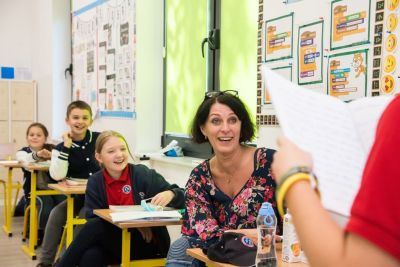
None of us thought that the COVID 19 pandemic would last for so long. From its beginning in March this year. we have gone through various stages of teaching. Starting with online teaching, back to school, hybrid teaching and further online learning for grades 4-8. Since we have already used new technologies to work with, we had no major difficulties with it. The teachers in our school are at ease in all these situations. It is undoubtedly also thanks to the school and its Management, which does everything to ensure that learning runs smoothly while maintaining a high level of education. In order for every teacher to feel comfortable with teaching from home and for the learning to proceed smoothly, over 20 new computers have been purchased, which undoubtedly have improved online learning even further.
Even the pandemic did not prevent us from organising important for us events. And so, on October 26th, just like every year, we celebrated the United Nations Day. This year's event was different from the previous years. This school year we celebrated in each class only (live and on-line). Each class has prepared numerous posters and presentations about the chosen country.
Students from grades 0-3 who were studying at the school premises organised Halloween. There was no annual disco, but the kids had a great time creating scarecrows and different masks. Of course, we also didn’t forget about those who have online learning.
View recent COVID-19 updates from Polish British Academy of WarsawPolish British Academy of Warsaw: This primary school, named after Jan III Sobieski, is a bilingual school located in Warsaw's Wilanów district. It has been in existence since 2012, when the "Kids' Academy Primary School" was established. It has ensured continuation of education for the children of the kindergarten at the "Kids' Academy." The school is a member of the Council of British International Schools (COBIS). The students come from many different nationalities. One of the main goals of the school is to instill respect and tolerance for the pupils of the traditions of different nationalities and cultural groups, and to respect diversity. The school teaches according to the Polish core curriculum expanded to include the core curriculum of the British Curriculum. Children learn in a bilingual system, in English and Polish. English is the language of instruction. From class III, children learn an additional foreign language, which is Spanish. PBA students take the Cambridge Young Learners (YLE) language exams recognized throughout the world. The school provides students with three meals a day, and students are required to wear uniforms. Since 2004, it has also run the Kindergarten Kids' Academy Preschool, initially in Konstancin-Jeziorna, and since 2007 located in the Wilanów district of Warsaw. This school offers bilingual (Polish and English) instruction using language immersion and glottodidactics.
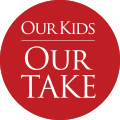
Gallery showcasing school life and general photos of Polish British Academy of Warsaw.

Gallery showcasing specific locations and facilities found at Polish British Academy of Warsaw.











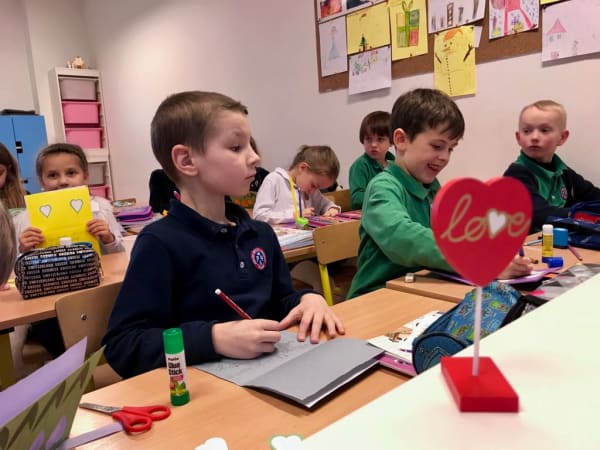







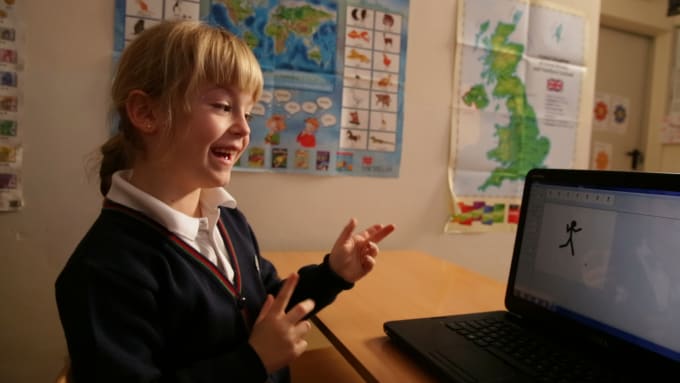




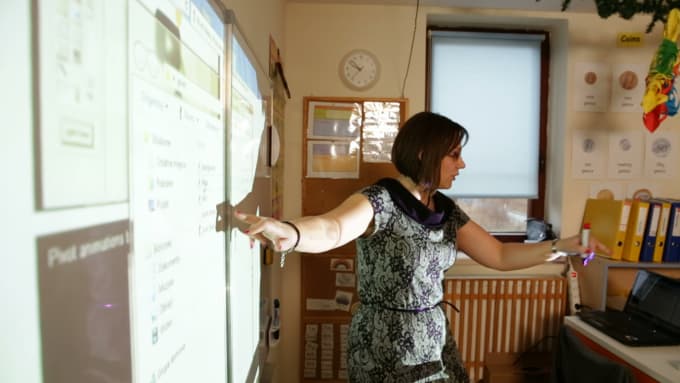







Central to your child's school experience is the underlying curriculum taught in the classroom. "Curriculum" refers to both what is taught and how it's taught. When considering the different curricula outlined in the next few pages, keep in mind that few schools fall neatly into one category or another. Most schools' curricula comprise a blend of best practices drawn from multiple curriculum types. Having said that, most schools do have a general overall curriculum type. These are identified for each school on OurKids.net.
Primary Curriculum: Liberal ArtsSuch an approach to curriculum shares with traditional programs their emphasis on core knowledge-acquisition, but tends to borrow more best practices from the progressive approach. The goal isn't to prepare students for vocational life, but rather to encourage an appreciation of the benefits of education itself, including academic and personal development. There is an emphasis on knowledge acquisition as well as theoretical and academic learning, but the real focus is on cultivating the intellect.
Secondary Curriculum: Academic| Focus |
|---|
| Academic |
| Subject type | offered |
|---|---|
| Learning strategy and study counselling; habit formation | |
| Extra support and minor accommodations for children experiencing subclinical difficulties |
| Subject type | offered |
|---|---|
| Accommodations | |
| Modifications | |
| Extra support |
| Special needs | Accomodations
Formal adjustments are made to the delivery of lessons to help mitigate the learning difficulty or exceptionality. The underlying content and expectations remain unchanged with accommodations, however. (Example: allowing a student to write tests in a quieter room). | Modifications The underlying content and expectations are modified and/or simplified for the sake of the student. (Examples: allowing student to use a calculator on a test when other students can’t; allowing students to bring word-banks or “cheat sheets” into certain tests, etc) | Remediation Research-based therapeutic measures that target and ameliorate the underlying weakness. |
|---|---|---|---|
| Learning disabilities | |||
| ADHD (moderate to severe) | |||
| Dyslexia (Language-Based Learning Disability) | |||
| Auditory Processing Disorder (APD) | |||
| Dyscalculia | |||
| Dysgraphia | |||
| Language Processing Disorder | |||
| Nonverbal Learning Disorders (NLD) | |||
| Visual Perceptual/Visual Motor Deficit | |||
| Developmental | |||
| Autism | |||
| Asperger's Syndrome | |||
| Down syndrome | |||
| Intellectual disability | |||
| Behavioral and Emotional | |||
| Troubled behaviour / troubled teens | |||
| Clinical Depression | |||
| Suicidal thoughts | |||
| Drug and alcohol abuse | |||
| Oppositional Defiant Disorder (ODD) | |||
| Physical | |||
| Dyspraxia (Developmental Coordination Disorder) | |||
| Blindness | |||
| Deafness | |||
| Cystic Fibrosis | |||
| Multiple physical |
| Program | offered |
|---|---|
| Full-time gifted program (parallel to rest of school) | |
| Part-time gifted program (pull-out; parallel to rest of class) |
Curriculum delivery: This information is not currently available.
| Program | offered |
|---|---|
| Custom subject enrichment (special arrangement) | |
| Custom curriculum compacting (special arrangement) | |
| Guided independent study (custom gifted arrangement) | |
| Cyber-learning opportunities (custom gifted arrangement) | |
| Formalized peer coaching opportunities (specifically for gifted learners to coach others) | |
| Custom subject acceleration (special arrangement) | |
| Career exploration (custom gifted arrangement) | |
| Project-based learning (custom gifted arrangement) | |
| Mentorships (custom gifted arrangement) |
In grade Gr. 6, PBA students perform an average of 45 mins of homework per night.
| PS | 0 | 1 | 2 | 3 | 4 | 5 | 6 | |
|---|---|---|---|---|---|---|---|---|
| PBA | 0 mins | 0 mins | 15 mins | 15 mins | 30 mins | 30 mins | 45 mins | 45 mins |
| Site Average | 2 mins | 8 mins | 16 mins | 16 mins | 23 mins | 29 mins | 34 mins | 39 mins |
This school frequently "flips the classroom": asks students to learn material at home and do the "homework" in-class (with teacher support).
| Sports Offered | Competitive | Recreational |
|---|---|---|
| Basketball | ||
| Fencing | ||
| Football | ||
| Gymnastics | ||
| Martial Arts | ||
| Swimming | ||
| Volleyball |
| Clubs Offered |
|---|
| Foreign Language Club |
| Math Club |
| Musical theatre/Opera |
| Science Club |
| Art Club |
| Chess Club |
| Choir |
| Dance Club |
| Drama Club |
| Environmental Club |
| Grade | 0 | 1 | 2 | 3 | 4 | 5 | 6 | 7 | 8 |
|---|---|---|---|---|---|---|---|---|---|
| Day | zł32,740 | zł39,290 | |||||||
This information is not currently available.
| Grades | Enrollment |
|---|---|
| PS/Kindergarten (2,5 years) to Gr. 8 | 70 |
| PS/Kindergarten (2,5 years) to Gr. 8 | 277 |
| % of foreign students | 40% |
| # of nationalities attending school | 24 |
| PS | 0 | 1 | 2 | 3 | 4 | 5 | 6 | 7 | 8 | |
|---|---|---|---|---|---|---|---|---|---|---|
| Class Size | 12 | 14 | 18 | 18 | 18 | 18 | 18 | 18 | 13 | 18 |
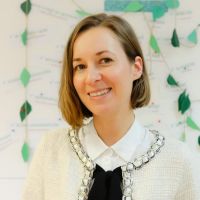
We are an international school, a member of the prestigious Council of British International Schools (COBIS). Our main goal is to provide a high level of education in line with the Polish and British educational systems. We want to give your children a good basis for their future school career, regardless of whether they will continue their education in Poland or abroad. We teach in English and in Polish, so students can feel at ease living in an international society but at the same time feel at home while in Poland.
At Polish British Academy, we aim to provide a happy, stimulating and healthy environment for the children and we want each child to achieve the best they can. We have excellent teachers and administrative staff who all work as a very close team. Our Governing Body plays an essential role in the development and success of the school. Many parents work with us in partnership as our goal is to feel a strong sense of community.
I am extremely honoured to be the Headmistress of Polish British Academy of Warsaw and I believe that when children move on from our school at the end of Year 8, they are responsible, confident and independent young people, ready to enter both the local and international society.
Maria Fiedorczuk-Piechota
Headmistress

April 16, 2020
Online teaching at the Polish British Academy of Warsaw
During the COVID-19 pandemic, when schools, preschools and nurseries closed, the Polish British Academy of Warsaw began distance learning ...

April 3, 2020
Nauczanie online w Polish British Academy of Warsaw
Wobec pandemii i zamknięcia szkół, Polish British Academy, jak wiele innych szkół niepublicznych, rozpoczęła nauczanie na odległość ...